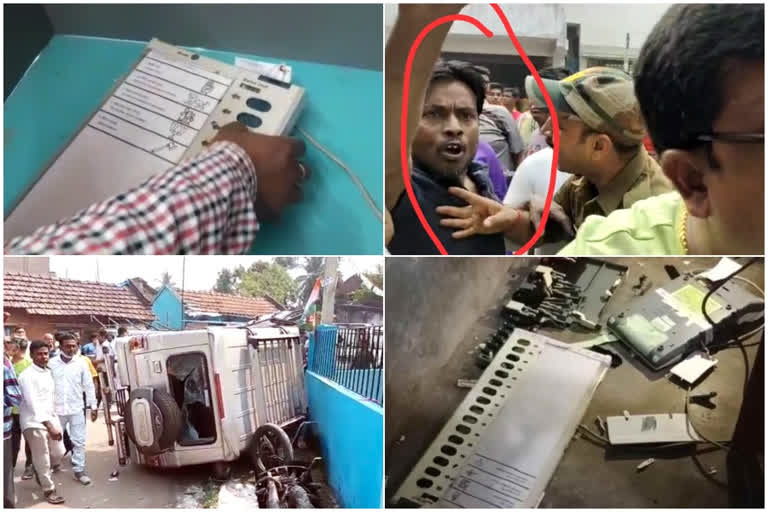Kolkata: The number of caste-related or religion-related clashes or riots in West Bengal are far lesser than the other Indian states. However, that is being compensated by the overwhelming political riots or elected-related violence in any election in the state. How can this end? What do political observers have to say? ETV Bharat tries to find an answer.
West Bengal had always been considered as the cultural and heritage capital of India. But whenever elections come, that cultural face of the state gets defaced by a series of the incidents of political violence, blatant election malpractices and rigging. Without pointing fingers towards any particular party, it can be said that such events of political violence do not coincide with the cultural face of the state.
Informed circles believe that Bengalis had always been a politically conscious community. So attempts for religious or caste divides here are always met with massive resistance from the people of the state. Still in election times this state becomes an open field for the show of muscle power. Now who can really be blamed for this particular phenomenon? If Bengal and its people can resist religious or cast riots in a united manner why do they fail in case of political violence.
The opinions expressed by the leaders of different political parties are divided on this count. The opposition parties have blamed the ruling Trinamool Congress for this phenomenon. On the other hand, the state's ruling party, Trinamool Congress has claimed that since the opposition parties in the state have lost their political relevance, they are resorting to such baseless allegations.
Senior Congress leader and All India Congress Committee (AICC) member, Suvankar Sarkar says that the people of Bengal could take an extremely strong stand in the name of communal divisions. "However, unfortunately the people of the state are unable to take the same stand against political and election related violence. This is out of a sheer scare for much bigger and more serious harassment by the ruling party and the administration which includes implication in false cases, days behind bars without trial, financial penalty and social harassment. The people are afraid that in case they protest, they will meet the same fate like student leader Anis Khan, who was allegedly killed by police personnel," he said.
CPI(M)'s central committee member, Robin Deb said that West Bengal has become the "slaughter ground" of democracy. "The ruling party does not allow the minimum democratic space for the opposition parties. Show protest against the ruling party oppression is slowly fading out," he said.
Trinamool Congress Lok Sabha member and the party spokesman, Sougata Roy said that one should not forget the past. "During the previous Left Front regime, we could feel how difficult it was to conduct political activities in the state. Currently the media is too active and diversified, which was not the case earlier. Because of the overactive media people get the chance to criticize or abuse the current ruling party. Trinamool Congress does not support any kind of political violence. However before blaming the state’s ruling party one should be aware of the realities of the past. Just as Trinamool Congress does not support communal politics, it also does not endorse political violence," he said.
Former registrar Calcutta University, Rajagopal Dhar Chakraborty says that it is no more true that people of Bengal are totally against communal politics. "If any such party comes to power in the state in future which prefers blending politics with religion, then we can see a changed face of secular Bengal. As regards the ongoing political violence in the state all I can say is that this is the sheer reflection of lack of values in politics. The winning margin is more important that the victory now. That is why there is so much violence in any election. Each and every political party will have to take responsibility for that. Mere verbal assurance will not be enough. The parties will have to prove their sincerity at the ground level,” he said.
On the other hand renowned political analyst and the former principal of the-then Presidency College, Dr Amal Kumar Mukhipadhyay said that a long history of political violence had been there in West Bengal since 1977. “But time has come to break out of that rotten legacy. However, I doubt whether the political parties would be able to get over it. At the same time secular politics is a thing of the past for current West Bengal. The poison of communal politics is slowly setting in the minds of secular Bengalis,” he said.




